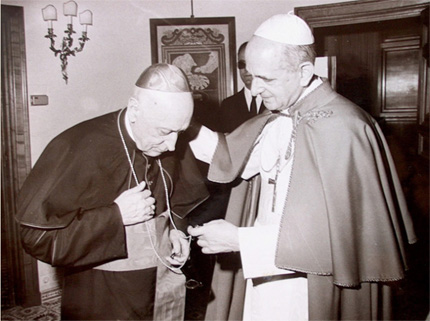|
Plinio Corręa de Oliveira
Whatever Budapest Wants
Folha de S. Paulo, 20th October 1974 |
|
|
On the basis of the memoirs of Cardinal Mindszenty published in The Sunday Telegraph, I wrote last Sunday about the simultaneous moves of Paul VI and Nixon, carried out according to the imperative desire of the Communist government of Budapest, in order to uproot the glorious Prelate from Hungarian soil. I described the sinuous negotiations whereby the Vatican reached an agreement with the Prelate, his journey to Rome, the warm reception which Paul VI gave him, and the first blow that he received from the semi-official paper of the same Paul VI. Now we will continue this narrative, which is so crushing to one who, like myself, loves the Vatican from the very depths of his soul. Paul VI wanted Cardinal Mindszenty to concelebrate Mass with him before going on to Vienna. At the end of that Mass, he gave him, "as a symbol of love and respect," the Cardinal's cape which he used before becoming Pope. He promised him support, saying in Latin: "Thou art and shall continue to be the Archbishop of Esztergom and the Primate of Hungary. Keep on working, if thou hast any difficulty, always turn back confidently to us." Afterwards... In Vienna, Cardinal Mindszenty began his normal activities, which he summarizes like this: "the pastoral care of hundreds of thousands of Hungarians in exile; warning the people of the world against the danger of Bolshevism, by the publication of my memoirs; and whenever possible, taking a personal interest in the tragic fate of the Hungarian nation." Then the persecution began: (1) Cardinal Mindszenty asked that the faculty to indicate priests for the Hungarian communities outside of Hungary be returned to him. The result, bitter disappointment. The Cardinal comments: The request was refused by the Vatican in order not "to annoy the regime of Budapest." (2) For the same purpose of not "annoying the regime of Budapest," the Holy See went ahead and decreed that all the public declarations of the great Prelate must be submitted to an adviser indicated by Rome. Cardinal Mindszenty came back sharply that he would submit them "only to the Holy Father when he explicitly asked for them." (3) As a help for the moves of Rome, the Magyar Bishops, named by Paul VI but entirely subject to the Hungarian government, began to multiply protests to the Holy See against the anti-communist activities of Cardinal Mindszenty. Then a surprise bomb exploded. The apostolic nunciature in Vienna informed Cardinal Mindszenty that during the negotiations in 1971 the Holy See had given guarantees to the Hungarian government that, once freed, his Eminence would say nothing that could be inconvenient for Budapest. This guarantee, given unbeknown to the Cardinal, violated that which was most essential in the agreement being negotiated between him and the Vatican at that time. By making such a concession to the Hungarian government, Paul VI employed the authority conferred by Our Lord Jesus Christ on St. Peter, in order to force the Cardinal not to oppose the plans of Communist imperialism. The keys of Peter functioning according to the desires of implacable atheist persecutors of religion: What is this, if not a bomb, probably the greatest bomb in the History of the Church, from Pentecost up to our day? (4) Immediately thereafter, the directives of the Hungarian government began to make themselves felt through the Vatican. In Portugal, a discourse was being printed for the Cardinal to read at Fatima. Emissaries of the apostolic nunciature in Lisbon intervened at the printers in order — without the Cardinal knowing about it — to suppress a passage in which he was alerting the Catholics of the world against the policy of smiles for the Communists. (5) The worst was yet to come. Sometime later, Paul VI wrote to Cardinal Mindszenty, asking him to resign from his Archdiocese. The Cardinal refused. Paul VI deposed him. And then, a particularly bitter touch; the letter was handed over to the Cardinal precisely on the day that he was commemorating the 25th anniversary of his glorious imprisonment by the Communists. The drama was ended. All during its course, from the beginning to the end, the conduct of the Vicar of Christ was what Communist imperialism desired, that is, what the antichrist desired.
Commentary? — What for? Only one remark: Since in its essence the "detente" of Paul VI is like this, obviously it must be the same in other countries, all over the world, ...and in the United States.
|
|


